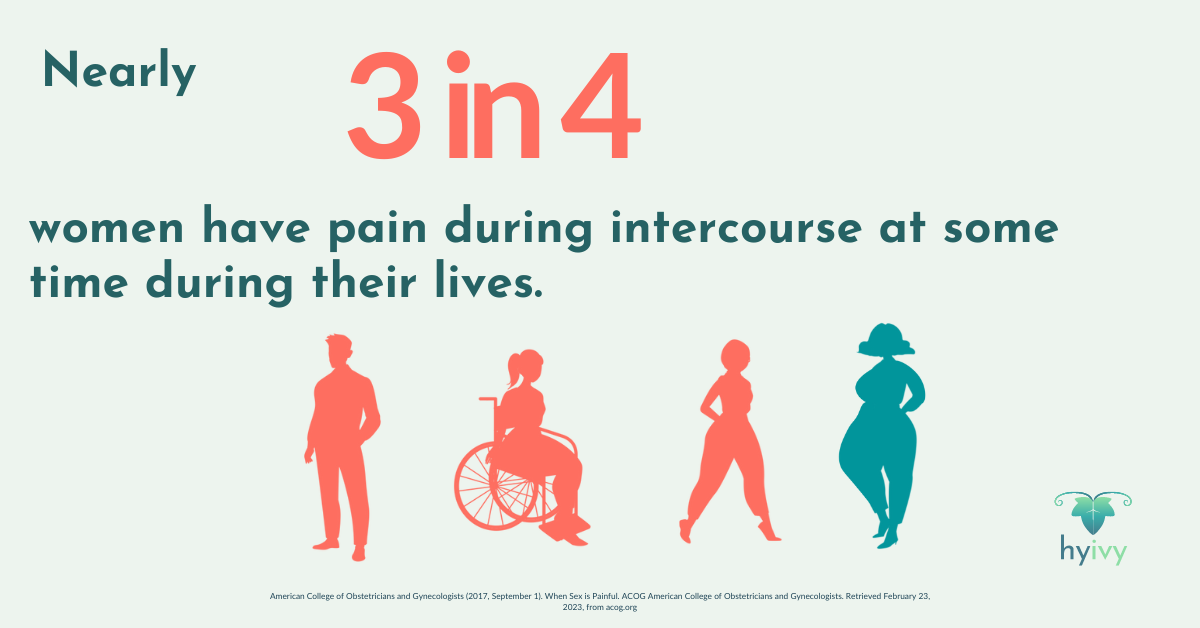What is Painful Sex?
Painful sex, or dyspareunia (dis-puh-ROO-nee-uh) is pain in your genitals or pelvic area occurring before, during, or after sexual intercourse.
Sexual intercourse comes in a wide and unique variety of forms and may mean different things to different people. This can include genital-to-genital, mouth-to-genital, and toy-to-genital contact as well as penetration and stimulation of the anus.
Although painful sex can affect all kinds of folks, today’s post will be focusing on dyspareunia experienced by people with vulvas and vaginas that involves the act of penetration by a penis, fingers, or toys.
Is Painful Sex Normal?
According to the American College of Obstetrics and Gynecologists (ACOG) painful sex is a very common problem with 3 out of 4 women and female identifying people experiencing painful sex at some point in their lives.
Some people may experience painful sex for a short period of time, while for others this can be a lifelong problem that can severely impact relationships, quality of life, and mental health.
Although painful sex is common, it’s not normal.
There are multiple reasons why you might be experiencing pain during sex. It’s important you always speak to a medical professional to help you identify the reason, or multiple reasons, why you’re experiencing pain as the first step towards pain-free sex.
What Does Painful Sex Feel Like?
If you’re experiencing painful sex, you may feel pain in your vulva, the area surrounding your vagina called your vestibule, within your vagina, and in your perinium.
Dyspareunia can be experienced as:
- Entry Pain (intraorbinal or superficial) is pain you feel at the entrance of the vagina with penetration
- Deep pain (collision) is pain you feel with deep penetration in your cervix or lower abdomen, this can worsen with different positions
Painful sex is also sometimes categorized as primary, secondary, complete, or situational:
- Primary pain is pain that you’ve always experienced since becoming sexually active
- Secondary pain is pain that develops after having a time of experiencing pain free sex
- Complete pain is when you experience pain every time you have sex or with any insertion including a finger, tampon, or toy
- Situational pain is when the pain only happens in certain situations or positions
Some sensations of painful sex include:
- Stabbing or sharp pain with penetration
- Deep pain with thrusting
- Aching or throbbing after intercourse
- A feel of burning
- Pelvic cramps that feels like menstrual cramping
- A feeling a muscle spasms or tightness
What Causes Painful Sex?
Some causes for painful sex include:
- Vulvodynia
- Vaginismus
- Vaginal atrophy or dryness caused by medication, menopause or other hormonal issues
- Radiation induced vaginal atrophy
- Vaginal infections like yeast infections
- Endometriosis
- Uterine fibroids
- Pelvic inflammatory disease
- Sexually transmitted infections (STIs)
- Intercourse too soon after childbirth
- Injury to the vulva or vagina including tears or cuts
- Skin allergy or irritation
How Is Painful Sex Treated?
Treatment will depend on your diagnosis and what your underlying issues are.
Some common treatments include:
- Medications to treat infections and allergies
- Estrogen creams or tablets for vaginal dryness or atrophy caused by decreased hormone levels
- Vaginal dilators to help to gradually stretch and relax the pelvic floor muscles
- Pelvic floor physiotherapy
- Talk therapy with a certified professional
One thing to remember is that if you are experiencing painful sex, you are not alone. Everyone will take their own time to get to the amount of sexual activity they prefer. The most important thing is to listen to your body.
————
Is there a blog topic you’d like us to cover? Reach out today to let us know.
Here at Hyivy Health, we’re dedicated to helping you down there and everywhere. The purpose of this blog post is to offer resources and education about pelvic health and is not intended to serve as medical advice. The information provided above is not a substitute for the treatment, advice, or opinion of a medical professional. Always consult with a certified health professional before starting any treatments.
